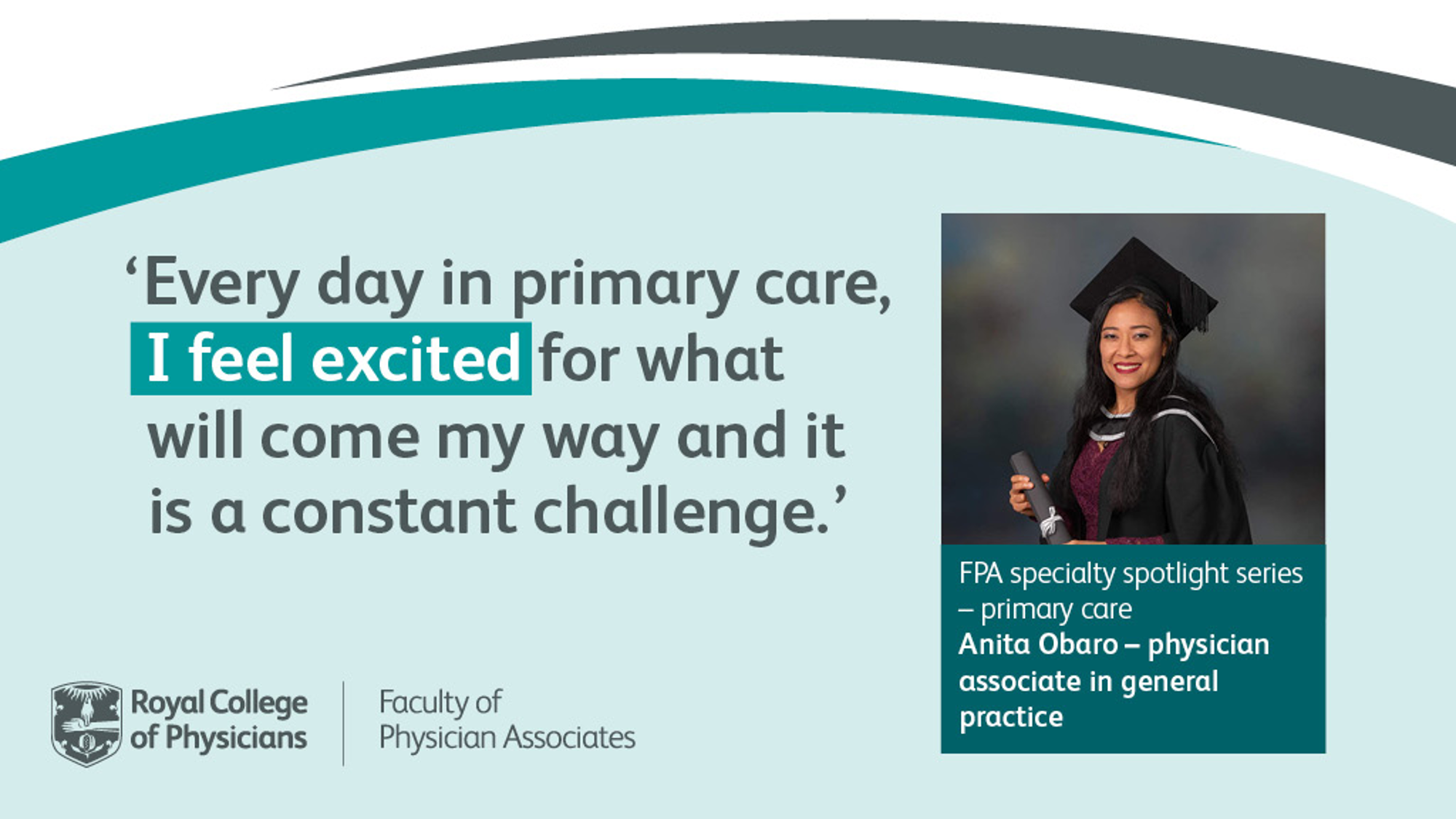Spotlight series – physician associates in primary care | Anita Obaro
Each year, physician associates (PAs) continue to positively impact primary care, and the number of qualified PAs entering the area increases. Primary care involves a range of common medical conditions, so the generalist PA role is a perfect fit.
Anita Obaro qualified as a PA from the University of Aberdeen in 2015 and immediately began working in a primary care setting. Here, Anita shares how her family inspired her to enter healthcare and why she thrives working in primary care.
What made you decide to become a PA?
I come from a family of healthcare professionals, and both my parents are doctors. I knew from a young age that I would follow in their path. As a mum and mature student, a 5-year commitment to medicine didn’t suit my lifestyle. I learned about the PA course from a friend who was a practice manager at a GP surgery. She explained how it was a generalist, patient-facing role, but there was also scope to take up more specialist roles.
Having carried out some research, I found that it fitted my lifestyle and career needs well. I enjoy a challenging environment and thrive when doing something different every day, therefore, the PA role suited me perfectly.
Can you tell us more about your experience of working as a PA in primary care? 
During my course, I thoroughly enjoyed my primary care placement and the continuity that it provided for patients. It was my favourite placement and influenced my decision to work in primary care upon qualification as a PA.
I was within the third cohort to qualify from the University of Aberdeen, and the PA role was still new. At the time, there were no employed PAs in partnered practices in my health board. Luckily, the practice where I undertook my placement was very positive towards the PA role; my clinical supervisor told me that, when I qualified, they wanted me to come back and work with them; this was very humbling. I learned a lot in the 6 years that I remained with the team. After having moved away from the area, I have recently joined a new practice and am looking forward to working in another primary care setting.
What diagnostic/investigation/procedural skills have you gained?
The practice I joined was large and they had a constant stream of trainees joining them. This included GP trainees and medical and nursing students, so my training was extensive and I never felt limited. I was also their first PA, helping to set the foundations for the future; something for which I am so grateful.
I began working closely alongside the GPs and nurse practitioners, acting as almost an interface between the two. This benefited me greatly as I was exposed to a wide range of clinical cases. I was trained in respiratory conditions, diabetes, gynaecology and women’s health, including examining pregnant women. I also had the opportunity to work as part of the chronic disease management team managing conditions such as asthma, chronic obstructive pulmonary disease, diabetes and hypertension.
My training included video-recorded consultations, which meant I could watch them back with the GP and form plans for improvements. This helped to accelerate my consultation skills. I enjoyed having the opportunity to train new PAs and other allied health professionals who entered the practice. It was exciting to use the training plan based upon the foundations that I created.

How would you describe the impact your role as a PA has had in primary care?
Before I joined the practice, there were long waiting lists due to the limited capacity to offer on-the-day appointments to patients. Soon after I joined, we were able to run dual clinics each day, resulting in more on-the-day appointments becoming available to patients. I was working as a full-time clinician at the practice (running 10 sessions per week), so I was able to manage quite a large patient list and, importantly, be a consistent face and voice.
Initially, I had longer appointment times (20 minutes) with patients, which they appreciated as they could discuss their concerns in depth and not feel rushed. When I had reduced appointment times (10 minutes, which is the standard in primary care), I still saw and treated the same patients – therefore, offering them continuity of care.
What do you find the most enjoyable and rewarding being a PA?
I thrive on having multiple opportunities to expand my knowledge and learn new skills. Every day in primary care, I feel excited for what will come my way and it is a constant challenge. Anyone can walk through the door, and you need to have the ability to think on your feet and keep your knowledge up to date as medicine continues to evolve.
The thought process is challenging too. We must be aware of everything, and I enjoy this aspect. Each day offers a unique opportunity to see something new; this motivates me and allows me to enjoy primary care.
As a PA working in primary care, what challenges do you face?
As I had returned to the practice where I had trained, settling in among the team wasn’t daunting, and I feel lucky that I had this privilege. In the beginning, I was the only PA and it proved difficult to obtain acceptance from patients. They didn’t understand who I was or what I was there to do, so it was important to build their trust. I put a lot of time and effort into this. Since I worked full time, I was able to form trusted relationships as they were able to see me regularly, but it did take time and commitment.
I have recently moved away from Aberdeen and will be joining a new practice. As I have experienced building patient relationships once before, I am much more prepared this time around. While it still will be challenging, I’m excited at the prospect of building the same level of trust again.
Another obvious challenge facing PAs across all specialties is the inability to independently prescribe or request X-rays. This is a key part of working in primary care and, although we have designed ways to work around this, I feel that being an independent prescriber will make my job considerably easier and more efficient.
 What does the future look like for you as a PA?
What does the future look like for you as a PA?
My long-term aim is to remain in general practice and work towards helping other PAs become more established in primary care in Scotland. I have previously delivered sessions to primary care practices about the PA role to help educate patients and primary care professionals. I am currently the primary care PA representative on the NHS Grampian PA board. It involves working with PA students, encouraging them to enter primary care, and following them up during their primary care journey. Clinically, I am looking forward to training in minor surgery and joint injections in the future.
What advice would you give to a PA looking to practise in primary care?
There is a lot of autonomous working in primary care, which I thoroughly enjoy, but you need to have confidence in your ability and decision making. Being prepared to work alone in a clinical setting is important. I would urge students wanting to enter primary care to gain as much experience in similar generalist areas such as the emergency department and medical assessment units before moving into primary care.
Primary care isn’t a specialty you can enter and hit the ground running without prior experience or a practice that is committed to your training. Primary care is a challenging and fast-paced environment, but a very rewarding one too.
We’re always looking for qualified PA FPA members to share their story. If you’re interested in sharing yours, get in touch using the contact details below. If you’re thinking of a career as a PA, you can learn more about how to begin your journey here.
Get in touch to share your PA story:
Jenna Donaldson – FPA communications officer
[email protected]
